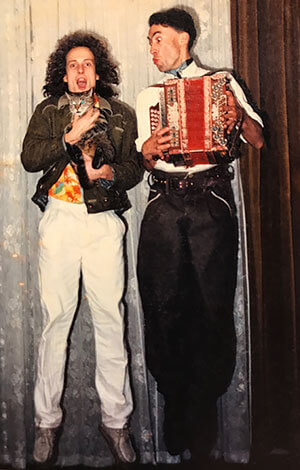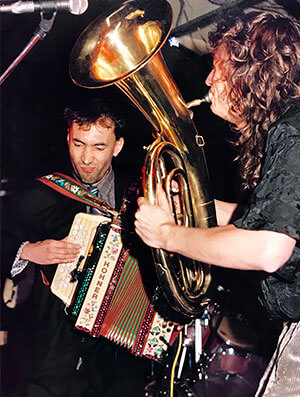HUBERT'S DESK
Those were the days
 In the eighties a battle for attention took place every evening in the Roter Engel. Wolfgang Staribacher, my co-Alpine Cat at the time, once hit the nail on the head: "Man, playing in the R.E. is like performing street music on a traffic island". It was indeed the case that the guests were vying to be seen and heard at least as much as the artists. Their talking was often loud enough that it was more a case of sensing the music than being able to hear it. And what came out of the P.A. system was mostly below the level of noise, thanks to noise protection. Many of the guests didn't give a damn about what was happening on stage. Performances were regarded as background noise and were at best atmospheric backing music for the personal stories people were busy telling each other. Sometimes it really did seem to me as though I was standing with my guitar in the middle of a busy roundabout. You "weren't even being ignored" and had to be ablaze to grab people's attention. It was in the Roter Engel of the eighties that I learned to fight for my audience.
In the eighties a battle for attention took place every evening in the Roter Engel. Wolfgang Staribacher, my co-Alpine Cat at the time, once hit the nail on the head: "Man, playing in the R.E. is like performing street music on a traffic island". It was indeed the case that the guests were vying to be seen and heard at least as much as the artists. Their talking was often loud enough that it was more a case of sensing the music than being able to hear it. And what came out of the P.A. system was mostly below the level of noise, thanks to noise protection. Many of the guests didn't give a damn about what was happening on stage. Performances were regarded as background noise and were at best atmospheric backing music for the personal stories people were busy telling each other. Sometimes it really did seem to me as though I was standing with my guitar in the middle of a busy roundabout. You "weren't even being ignored" and had to be ablaze to grab people's attention. It was in the Roter Engel of the eighties that I learned to fight for my audience.
Back then I also learned to get a grip on my stage fright. In the beginning I used to throw up before every performance. I would climb the three steps to the stage, accompanied by migraines, fever, toothache and stomach cramps. Until one day I took myself to task and said: "Hubert, if it's really so bad that it is making you ill, then it's not the right thing for you! If you get sick one more time, then that is it!"
From that moment on, I wasn't ill again. I was still and continue to be stressed and tense, but I was never ill again. It may have been less my emphatic words and more the need. After my three-hour gigs, the manager would give me 600 Schillings, about €44. Like a dog being thrown a bone, I needed that to make ends meet.
I couldn't afford a stock cube with what I earned from the performances of my "core vision". I was studying experimental music and electroacoustics at the Viennese University of Music and Performing Arts and every few months I premiered a new composition at the Alte Schmiede Art Association (not far from the Roter Engel, in Schönlaterngasse). There were seldom more than a dozen serious, pale-faced fellow students, together with a couple of friends who had accompanied my sound experiments. The pay was somewhat better than at the R.E., but since it came less often and the implementation involved higher costs, it was ultimately a zero-sum game.
The highlight was a string quartet I had composed in 1987. I worked on the five-movement piece for two months and received the incredible fee of 5000 Schillings (€350). I paid the musicians 1000 each and because it had been so wonderful with an enormous crowd of 40 people listening, I spent the remaining thousand on taking every contributor and my pregnant girlfriend to an Italian restaurant out of sheer joy.
It was therefore of existential importance to find a bread-and-butter job and this is what I found just a couple of streets further on at the Roter Engel in Rabensteig. I was able to draw on some blues and jazz standards and singer-songwriter classics, which had accumulated over the years. I played them through a few times and made sure that I knew the lyrics. Then I plucked up the courage to introduce myself to the manager. He gave me a date and a month later I was standing with a Western guitar on the little podium in the R.E., in those exceptional circumstances I've described.
After a few songs, things improved. Not least because I realised that there was no reason to panic, since nobody was paying any attention to me anyway. This relaxed me in the short-term, but in the long-term it was no good for my ego. Doing without a setlist gave me a life-changing moment. It was perhaps my fifth appearance at the R.E. and on this evening I had only pinned down the first three songs. After that I wanted to decide on the spur of the moment and according to the mood what should come next. The abyss awaited me beyond the third song. I could have drawn on a repertoire of maybe 100 pieces. Not one came to mind. It was my first classic blackout. A sensation spread from the pit of my stomach, at first well below freezing, but soaring above boiling just a few breaths later. It was happening right there. It grew quiet. The chatter ebbed away and you could have heard a pin drop. Everyone, including the waiter, was looking at me. I had their undivided attention. I'd done it. I didn't know what was going to happen next, but never mind.
During a visit back home in the Salzkammergut I had, in an admittedly somewhat bewitched state, a hands-on encounter with my grandfather's Styrian accordion. I had regarded it with hostility for years, but in attempting to rip it apart I had fallen under its spell. I was fascinated by how devotedly it responded to my roughing up and by its joyous moaning. So I took it with me back to Vienna and began to compose pieces on it. Shimmering, shrieking, swirling things, some of which even made it on to the radio in a series for contemporary Austrian music on Ö1.
 Emboldened, I took the accordion with me to the R.E. I began as usual with the guitar and a couple of reasonably acknowledged songs. Then I unpacked the Styrian. A shockwave went through the bar. It was physically palpable. I hadn't even played a note before a couple of guests were calling: "Bill, please!" I was evidently not the only one horrified by that instrument in particular and folk music in general. Just by placing my fingers on the buttons of the accordion, I was touching a trauma and the Austrian soul winced. That made it more of a challenge than ever. I wasn't just playing for my life any more, I was playing for that of the diatonic accordion too. We were a community of fate. And my playing literally shredded the tradition. I can well remember how I tore my first bellows. It was during the ecstatic last part of the instrumental piece Solide Alm. The composition marked the birth of the Alpinkatzen. My partner at the time, Wolfgang Staribacher, played keyboard and we had a drum computer, which was also used during the Alm. At the point of changing into double time, Wolfgang would activate the drum machine with a foot pedal and on this day, I slammed the sweat-soaked, sodden bellows of my accordion together so hard, they literally burst.
Emboldened, I took the accordion with me to the R.E. I began as usual with the guitar and a couple of reasonably acknowledged songs. Then I unpacked the Styrian. A shockwave went through the bar. It was physically palpable. I hadn't even played a note before a couple of guests were calling: "Bill, please!" I was evidently not the only one horrified by that instrument in particular and folk music in general. Just by placing my fingers on the buttons of the accordion, I was touching a trauma and the Austrian soul winced. That made it more of a challenge than ever. I wasn't just playing for my life any more, I was playing for that of the diatonic accordion too. We were a community of fate. And my playing literally shredded the tradition. I can well remember how I tore my first bellows. It was during the ecstatic last part of the instrumental piece Solide Alm. The composition marked the birth of the Alpinkatzen. My partner at the time, Wolfgang Staribacher, played keyboard and we had a drum computer, which was also used during the Alm. At the point of changing into double time, Wolfgang would activate the drum machine with a foot pedal and on this day, I slammed the sweat-soaked, sodden bellows of my accordion together so hard, they literally burst.
Wolfgang and I had met in the autumn of 1986 in the Roter Engel (where else?) and we decided to perform together. Not because we had a vision, but because it was more fun as a duo and because it worked out the same anyway. A duo made 1200 Schillings, a soloist 600. For a long time we had fun appearing under a different name each time. One time we called ourselves Willig und Billig (Willing and Cheap), another time it was Heuer Teuer (Expensive This Year), I don't remember them all any more. At some point we came up with Alpinkatzen (Alpine Cats), which mutated into Alpine Bunnies right on time for a show on Easter Sunday. One day, the manager Wolfgang Beneder asked me why we kept doing that. We told him that it was to shake off the groupies and to outwit those who had previously not appreciated our performance. As you know, in the long run it was not possible to escape the fans and the realisation that a Styrian accordion does not necessarily have to exude a sense of being stuck in the past spread from the Roter Engel, across Austria and beyond.
In closing, let me return to the image of a traffic island. It took a year, but we managed to make the "traffic" come to a standstill. We drew not just the whole bar under our spell of our music, but the people standing outside in the street and looking through the window too.
Even if it didn't always feel that way at the time, looking back it was a wonderful part of my life and my gratitude is eternally deep. To the Roter Engel, to the manager Wolfgang Beneder and to Michael Satke in particular. It was his vision, his idea, his bar and my stepping stone into the world.
© Hubert von Goisern
 This piece was written for the book
This piece was written for the book
Roter Engel: Wien 1981 - 1997
by Michael Satke
2018 Falter Verlag Wien | Amazon
